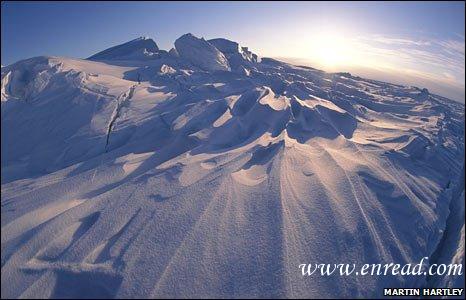| ||||||||||||||||||||||||||||||||||||||||||||||||
|
The Catlin Arctic Survey, a gruelling 10-week expedition to measure the thickness of sea-ice, has ended. Catlin北极调查,持续10周的繁重的测量北极海冰厚度的调查结束。 At 1750 BST on Wednesday, two planes landed safely on the floating Arctic ice to collect Pen Hadow, Ann Daniels and Martin Hartley. Their data will help study the impacts of global warming in the region. It also reinforces a new forecast, by a leading UK scientist, who says that the Arctic sea-ice could vanish in summertime far sooner than predicted. The Catlin survey ended slightly ahead of schedule to ensure a safe pick up. Speaking on a live link from the Arctic landing strip, Mr Hadow said that it had been a difficult but successful expedition. "In our time here we have captured around 16,000 observations and [taken] 1,500 measurements of the thickness of the ice and snow as well as its density(密度)," he said. He added that his team was now handing its valuable data, collected primarily through drilling following the failure of a mobile radar1 unit, over to the scientists. "[The data] seems to suggest it was almost all first-year ice," Mr Hadow said. He revealed(显示,透漏) that over the length of the survey the average thickness of the sea ice was 1.774m. "Our science advisors2 had told us to expect thicker, older ice on at least part of the route, so it is something of a mystery where that older ice has gone. It'll be interesting to see what scientists think about this." The Arctic ice could soon be a seasonal3 feature Thinner and thinner At the same time, Peter Wadhams, head of the polar ocean physics group at the University of Cambridge has brought forward his estimate for the demise4(死亡) of summer sea-ice in the Arctic. He believes the ice, which has been a permanent feature for at least 100,000 years, is now so thin that almost all of it will disappear in about a decade. He says it will become seasonal, forming only during the winter. He told the BBC: "By 2013, we will see a much smaller area in summertime than now; and certainly by about 2020, I can imagine that only one area will remain in summer." Although this bleak5(萧瑟的,严寒的) forecast is reinforced by the survey team's data, Professor Wadham's new assessment6 is based on analysis of nearly 40 years of sonar data(声纳数据) gathered on Royal Navy submarines patrolling beneath the ice - the first, HMS Dreadnought, was in 1971.
点击  收听单词发音 收听单词发音
|
||||||||||||||||||||||||||||||||||||||||||||||||
- 发表评论
-
- 最新评论 进入详细评论页>>





